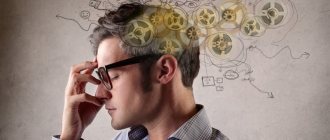The concept of conscience is usually used to refer to an individual’s ability, expressed in the independent formulation of moral duty, norms and implementation of moral self-control, the requirement from one’s own person to fulfill them and the evaluation of the actions performed by the individual himself. It is one of the manifestations of moral self-awareness. It is revealed simultaneously in the rational understanding of the moral significance of the actions performed and emotional experiences expressed by feelings of guilt, “torments” of conscience. Simply put, the two aspects described link together the emotional component with the mind.
Conscience as a psychological problem
The term in question is considered an ethical category, but is studied by various sciences: philosophy, sociology, psychology. The latter's interest in it increases when the personality quality of conscience is transformed into a psychological problem.
For example, the Swiss psychiatrist K. G. Jung attributed the analyzed category to the individual’s ability to critically evaluate actions and thoughts from a moral standpoint. He argued that this is a conscious adherence to a spiritual value system. This concept is also characterized by the presence of a connection with the individual’s self-awareness and volitional self-regulation.
Conscience can be conditionally divided into two tiers: subjective value judgments and objectively existing ones. Pangs of conscience appear when subjective values are affected. Simply put, what an individual correlates with his own person, what is good and bad for him. If objective values are violated, when another subject acts immorally, then the individual himself may feel disappointment, regret, may be angry, but will not be tormented by feelings of guilt.
Conscience is expressed in various forms: as a complement to reflection, in dreams, as an affective reaction during the course of mental processes (for example, a feeling of fear that arises when a situation comes into confrontation with the values of the individual).
The voice of conscience may not always be recognized by the individual himself. The internal auditor often speaks in dreams or manifests itself in anxiety, worry, fear, and guilt. At the same time, systematic discrepancies with conscience, intentional or unconscious neglect of its hints lead to psychosomatic deviations and neuroses.
So, to the question: “what is conscience,” psychology answers that it is a personal quality that is connected with the individual’s subjective understanding of his own duty, moral standards and responsibility to society and individual human subjects. Conscience is a product of the social in the individual. Animals lack this quality.
Thus, pangs of conscience represent a person’s dissatisfaction with himself, disappointment in himself, a feeling of guilt, and fear. They are a response to actions that contradict the internal moral foundations of the individual.
The analyzed quality becomes a psychological problem when it transforms into a feeling of guilt. Constant pangs of conscience lower self-esteem, rob a person of self-respect, and often even drive him into depression.
Conscience is part of the soul. When people are in harmony with their own values, they experience satisfaction. And when they constantly transgress their own established boundaries of morality, then suffering and torment become their constant companions.
Conscience, first of all, acts as a virtuous principle in a person, contributing to his moral self-control and moral and ethical self-esteem, and also, its severity and hostility awaken fear in a person and intensify his pangs of conscience, which is dangerous, as already written above, by the emergence of mental disorders.
The internal confrontation between the desire to satisfy a person’s aspirations and the disciplining attitudes of conscience is the breeding ground on which neuroses breed.
Conscientiousness according to Erich Fromm
Since Eric Fromm experienced all the evils of Nazism, he described in his books how freedom and conscience can be harmful even in the most civilized societies. To explain how, for example, Adolf Eichmann could plead for mercy for a mass murder in 1961, justifying that he was only “keeping order” in making the final decision, it is accessible to refer to Fromm's idea of the authoritarian conscience.
Eric Fromm was a child of the Holocaust and tried to explain how civilized people could descend into barbarism and why they felt no remorse after it. For this purpose, he invented such a term as authoritarian conscientiousness.
What is conscience? The definition reads: it is the voice of an external power, something close to Freud's concept of the superego, which has already been discussed above. This inner voice may be reinforced by fear of punishment or aroused by admiration (or may even be created because the person idolizes an authority figure, as was the case with Hitler's followers).
Note that the voice of the authoritarian conscience is respected not because it is good, but because it is in power. Thus, the Nazis also commit brutal evil because they obey a voice that comes from outside, bypassing their own moral sense. The presence of an authority figure is necessary to strengthen and maintain this voice, otherwise it loses its power.
In contrast to the authoritarian conscience, its humanistic variety (also according to Fromm) is a voice present in every person and independent of external sanctions and rewards. It is based on the fact that people have an intuitive knowledge that determines what is human and what is inhuman, what improves life and what destroys it. This sense of conscience serves our functioning as humans. This is the voice that calls everyone to themselves, to their humanity. Thus, remorse of the humanistic type determines consciousness. And such fundamental concepts in psychology and jurisprudence as honor and conscience (reason and conscience) constitute unity.
Living according to humanistic canons, sincerely admitting one’s own mistakes is, according to Fromm, the answer to the question of how to get rid of remorse.
How to raise her
The concept in question is defined as moral consciousness, instinct or feeling in an individual. Conscience is the inner understanding of good and evil. It is the ability to identify the quality of an action. The analyzed concept encourages the individual to truth, leads to goodness, and turns away from lies.
There are many arguments indicating that conscience, in its adequate manifestation, is a natural and necessary property of a person, preserving his health and prolonging his life.
People who have clear moral values are respected by society. It’s more comfortable and reliable with them, which is why many people prefer to have such people as friends or business partners. The ability to act in accordance with one’s own developed principles, ideals, concepts of good and evil also gives firmness, determination, confidence to the individual himself.
Children's conscience begins to actively develop around the age of six. It is the duty of every parent to cultivate morality and conscience in their own children, despite the fact that they are completely different categories in essence. Morality consists of an infinite number of “taboos,” sometimes justified, sometimes not. What is immoral in Europe is considered normal in Asia.
For children, parents are a kind of external censors. Their primary task is to ensure that the child is able to distinguish good from bad. For the little ones, it is necessary to set the boundaries of what is acceptable.
We can distinguish 3 main principles in the formation of the ability under consideration: the development of a moral awareness of good and evil, the cultivation of the desire to act correctly and the development of an adequate response to one’s erroneous action.
Children should develop:
- internal skill - moral decision;
– the ability to recognize good and evil;
– a system of value guidelines that the baby should be guided by;
– reaction to deviation from one’s own values;
- desire to act correctly.
As a person grows up, he grows out of the rules born in childhood. At first, this is observed in puberty, when the individual gradually becomes cramped within the old framework and restrictions. Then it arises in youth, when one’s philosophy of life is formed. If an individual’s personality is actively developing at this stage, then he will outgrow his own conscience, which will be replaced by meaningfulness and responsibility.
Therefore, a person needs to understand that responsibility for his actions lies entirely with him. You should not try to shift the blame for your own actions onto circumstances or the environment. Trying to justify yourself does not lead to good things. It is more effective and constructive to learn to correct the negative consequences of unseemly actions.
The role of conscience in relationships
Why do relationships between a man and a woman often fail? Everything seems to be fine, they love each other, but their happy life together comes to an end.
Often the reason for failed relationships that could have lived and developed are the “different” consciences of their parent families, which have directly opposite meanings. Usually one side does not want to accept the other side's “concepts” of life at all, so conflict is inevitable.
Is it possible to improve the situation? It is possible, but not for everyone; for some it is almost impossible. And the reason is that people are afraid of losing belonging to their family and the favor of their parents.
What can be done in this case? A man and a woman should reconsider the boundaries of the conscience of their parental systems and create their own concept, taking into account the interests of both parties.
What kind of person is without a conscience?
The analyzed concept is a unique mechanism for the moral assessment of actions, behavior and words. The comparison occurs with the spiritual system of values. This is precisely why attempts to shame loud youth or call a drunkard to his conscience are often useless. It is impossible to induce shame in people when the origin of the problem or the background of the conversation is of no value to the individual. This is what conscience is, examples of which, along with examples of its absence, can constantly be seen in everyday life.
Conscience varies from subject to subject. The development of internal moral guidelines is influenced by the manner of family upbringing, individual psychological personal characteristics, the social environment and development conditions, the state of society, the level of intelligence, and public culture. Thus, the described ability is a reflection of the internal principles, attitudes and values of the individual, his inner world.
Although conscience varies, it is present in all healthy individuals and absent in psychopaths—those with antisocial personality disorder. Such individuals are not able to sympathize, empathy is unknown to them, they do not understand emotions and do not recognize the needs of other individuals. For them, there are only themselves and their personal goals.
However, not only people with mental disorders are unscrupulous. Healthy individuals also suffer from the absence of an “internal censor.” Unscrupulous people, first of all, are aggressors; they know no pity. They consider themselves strong, smart, dexterous, cunning. At the beginning of their life path they are lucky, they are on the crest of success. People without conscience enjoy the benefits of civilization, gradually losing their soul. Today they deceived, tomorrow they stepped over their relatives, betrayed love, sold friendship. This is how unscrupulous people walk through life, losing loved ones, gradually becoming unnecessary to anyone. There are no things worse than loneliness and oblivion. Persons without conscience are unhappy people.
In educational institutions, students are often asked to write an essay on what conscience is, in order to make the future generation think about how important the “internal censor” is in life. After all, there is no future for a society without conscience. The definition of this concept is the moral consciousness of the individual. Conscience stores patterns of good and bad, right and wrong. She is also responsible for responding to the contradiction or consistency of another person’s actions or her own moral values.











